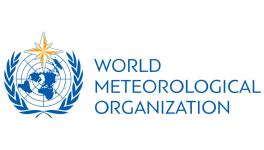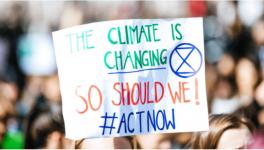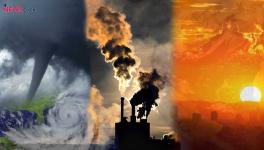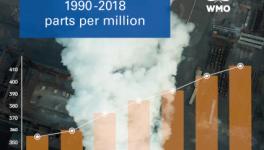UN Climate Action Summit Begins, Leading Climate Science Organisations Warn of Accelerating Impact
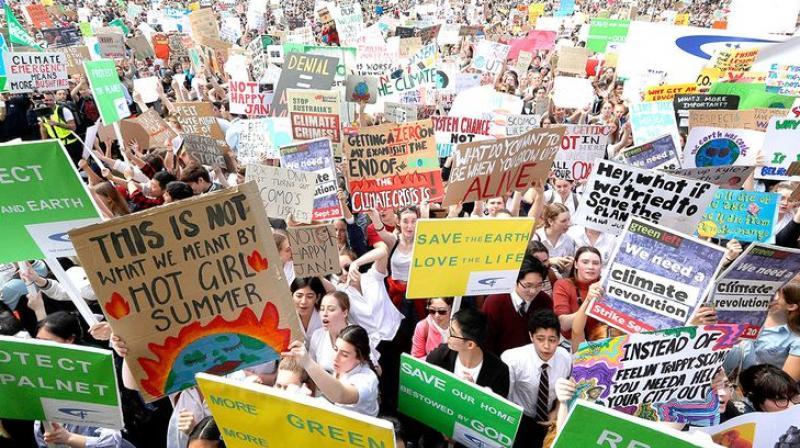
Image Courtesy: AP
The United Nations Climate Action Summit begins in New York from September 23 with a goal to concretise plans to fulfill the aim of mitigating climate changes. Four years have passed since the Paris Agreement, but to achieve its target still seems like a distant goal with carbon emissions continuing unabated, minimal control on deforestation and acceleration of the impact of the man-made conditions. This climate action summit is aimed at consolidating better commitments from the countries for stopping the global warming and further degrading the climate.
Ahead of the summit, world’s leading climate science organisations have joined hands to produce a landmark report, which underlines the growing gaps between the agreed targets to tackle global warming and the actual reality.
The report, called United in Science, details the current state of the climate and also provides trends of carbon emission and atmospheric concentrations of main greenhouse gases. The report highlights the urgent need for a socioeconomic transformation in sectors that are key to economics, like land use and energy, to avert the danger of irreversible impact of global temperature increase. The report also examines tools to support mitigation and adaptation as well.
The report was coordinated by World Meteorological Organisation (WMO) and compiled under the auspices of Science Advisory Group to the UN secretary general’s Climate Action Summit. The report will be presented to the representatives of the countries joining in the summit on September 23.
“The report provides a unified assessment of the state of our Earth system under the increasing influence of anthropogenic climate change, of humanity’s response thus far and of the far-reaching changes that science projects for our global climate in the future. The scientific data and findings presented in the report represent the very latest authoritative information on these topics,” said the Science Advisory Group, which is co-chaired by WMO Secretary General Petteri Taalas and Leena Srivastava, outgoing vice chancellor of TERI School of Advanced Studies.
Highlights of the report:
-
The period after the signing of the Paris Agreement [2015-2019], happens to be the warmest five-year period on record. The average temperature during this period is estimated to be 1.1 degree Celsius above the pre-industrial times (1850-1900). The outcome of the temperature increase was seen in the form of long-lasting heat waves, recordbreaking fires, and other devastations like cyclones, floods and droughts.
-
Sea-ice and ice mass have been estimated to have witnessed a continuous decrease. During 1979-2018, the Arctic summer sea ice has declined at a rate of 12% per decade, approximately.
Glacier mass loss is the highest for the period 2015-2019. The annual ice lost from the Antarctica has increased sixfold between 1979 and 2017.
-
Sea level rise is accelerating and also the sea water is becoming more acidic. During the period 1997-2006, sea level rose at the rate of 3.04 millimeter per year and at a rate of 4 millimeter per year during 1997-2006. The increase in ocean acidity is estimated to be 26% since the beginning of the industrial era.
-
Long-lived greenhouse gases such as carbon dioxide, methane and nitrous oxide have reached extremely alarming level. In 2018, global carbon dioxide concentration was 407.8 parts per million (PPM). The estimation says that the carbon dioxide emission of the year 2019 is on the track to cross 410 PPM.
-
Carbon dioxide emission touched a record high in 2018 with 37 billion tonnes of it emitted in the global scale. The energy and economic trend also suggests that 2019 will also have almost same level of carbon dioxide emission.
The report has been sent to almost 60 country representatives with an aim to further planning and commitment in the form of solid plans, so that the aim of zero emission by 2050 and of drastic emission reduction in the coming decade could become a reality.
Get the latest reports & analysis with people's perspective on Protests, movements & deep analytical videos, discussions of the current affairs in your Telegram app. Subscribe to NewsClick's Telegram channel & get Real-Time updates on stories, as they get published on our website.













